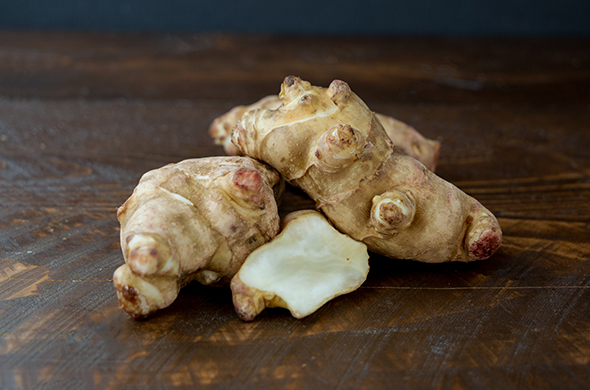Sunchokes, otherwise known as Jerusalem artichokes, are root vegetables that resemble the look of ginger with the texture of potatoes. Sunchokes are native to North America, originally found in the central United States and Canada before being introduced to France in 1616. It was with that journey to Europe that this knobby veggie first began to flourish and gain popularity. Sunchokes are perfect to sautée, purée, and roast; their flavor profile is nutty and sweet. These indigenous veggies are high in inulin, a prebiotic fiber that may help support healthy digestion.

Knee deep as we are in the world of probiotics, we would be remiss not to mention the crucial role prebiotics play in supporting a healthy microbiome (also known as your gut). We’ve written about the relationship between probiotics and prebiotics in the past, but to recap: Prebiotics are non-living, non-digestible carbohydrates found in different quantities in a variety of foods.
In non-technical terms, prebiotics are natural parts of foods that can’t be digested by people, but instead, provide food for probiotics. Without prebiotics to feed on, probiotics would have a hard time doing their job well inside your body, which is why it’s incredibly important to eat a variety of fiber-rich foods every day.
1 Cup of Sunchokes (sliced):
110 calories
2g of fiber
3g of protein
They also contain no fat, no cholesterol and are high in iron, vitamin C, potassium, and thiamine.
Add Them To Your Meal
Sunchokes have a slightly sweet, subtly nutty flavor and are delicious both raw and roasted. They’re often cooked as one would potatoes (except for the whole you can eat them raw thing – don’t eat white potatoes raw). We like them shaved and tossed in a salad with a vinaigrette by Seamus Mullen using Lifeway Kefir as its base, olive oil, lime zest, shaved raw garlic, and salt and pepper to taste. You can also use roasted sunchokes to add a nutty flavor in our favorite root vegetable soup.
You could also try to do half sunchokes and half potatoes in our Kefir Potato Salad. In fact, sunchokes can be a great alternative to potatoes for people with insulin sensitivities or who are living with diabetes, as they have a similar taste, but carry a lower glycemic load. If you have questions about including sunchokes in your diet, or to know more about whether they’re right for you, reach out to your medical professional, or better, yet, a registered dietitian nutritionist who knows your medical history.
Sunchokes can be an excellent addition to the diets of people who are looking to consume more gut-friendly prebiotic foods. Give them a try and see what you think!